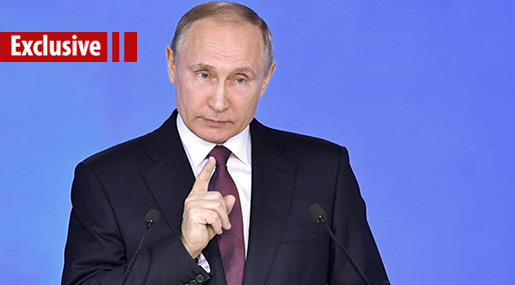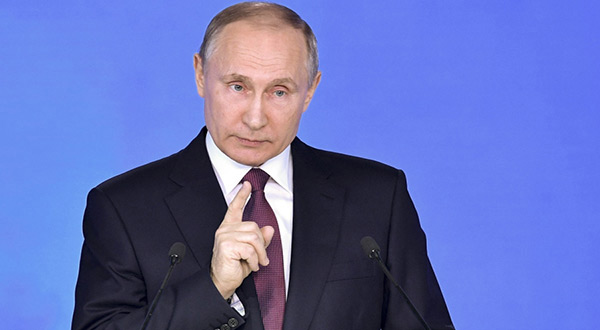
Putin’s Warning - Don’t Mess With Russia’s Allies

Darko Lazar
It is hard to say which was more impressive - Vladimir Putin's annual State of the Nation Address to Russia's Federal Assembly, or the unveiling of an array of new nuclear weapons that, unfortunately for the West, have no deterrent.

"Any use of nuclear weapons of any yield - small, medium or whatever - against Russia or its allies will be regarded as a nuclear attack against our country," the Russian President said on March 1.
Although the comments drew loud applause from his audience, there is little doubt that those words were directed at officials in western capitals.
So what prompted Putin to issue such a stern warning and which one of Russia's allies is the West thinking of attacking?
A declaration of war against Iran
Earlier this year, Washington updated its Nuclear Posture Review (NPR), which designated Iran, China, Russia and North Korea as potential threats to US national security.
One of the document's key components was the expansion of scenarios in which a nuclear threat would be considered as such. The NPR lists non-nuclear attacks as grounds for potential US nuclear retaliation.
Among the many supposed threats emanating from American adversaries, the document stipulates that Iran boasts the largest missile program in the Middle East and warns of its increasingly long-range ballistic missile capabilities.
Just a few weeks after the publication of the NPR, US President Donald Trump's national security adviser, Lt. Gen. H.R. McMaster, outlined Washington's objectives at the Munich Security Conference.
McMaster insisted that it was time to "counter Iran's destabilizing activities, including its development and proliferation of missiles", as well as its support for regional allies, which the American security chief referred to as "terrorist proxies and militias".
Similar statements by other US officials, coupled with constant lobbying from Tel Aviv for an attack on Iranian forces in Syria, suggests that the western war machine has Tehran firmly set in its sights.
"The Trump administration wants to bring Iran down. It wants to bring about regime change," said Richard Becker from the ANSWER Coalition. "I think if one looks at the map, you will see that Iran is surrounded by US military bases. The US is not surrounded by Iranian military bases."
Moreover, it is becoming increasingly evident that powerful interests in the US, along with "Israel's" Benjamin Netanyahu and a number of Arab monarchs in the Persian Gulf, are making real preparations for war with Iran.
Earlier this year, the Trump White House announced that it would terminate the 2015 landmark unclear agreement with Tehran unless Congress and European allies agree to ‘strengthen it'.
The American president then unveiled his own vision and passed it down to London, Paris and Berlin.
The West is now demanding that Iran abandon its peaceful nuclear energy program unconditionally and allow intrusive inspections of military facilities. Iran is also expected to give up its ballistic missile program or face a new round of sanctions from the US and Europe.
"I think the reason that the US demands Iran get rid of its missile program is in case it decides to attack. It wants to be able to reduce Iran's military defenses to the lowest possible level," Becker adds.
In essence, this is not so much a proposal as it is an ultimatum. The problem with ultimatums is that they are often followed by armed confrontations.
As such, the US, "Israel", and Saudi Arabia have already declared war on Iran.
The message from Moscow
Putin's State of the Nation Address was originally scheduled for earlier in the year but was reportedly postponed in anticipation of the new hawkish American nuclear doctrine, giving Moscow an opportunity to respond.
According to Paul Ingram of the British American Security Council, Putin meant to send "a very clear message - if you mess with us we will nuke you and we will not hold back."
"That is a strategic statement," Ingram added.
Through converging geopolitical interests, Iran and Russia have formed a strategic alliance with the objective of stabilizing and consolidating the Eurasian heartland.
As a result of Washington's opposition to these efforts, prospects for an American attack are ever-present, especially in the highly volatile Middle East.
But Marcus Papadopoulos, a publisher and editor of Politics First, warns that Putin's recent speech underscores a new reality.
"The golden days for America in the 1990s and the early 2000s are gone," Papadopoulos said. "The Russia of today is an extremely powerful, confident country and any American aggression or threats to Russian national security or to the national security of its allies will be met with a Russian nuclear strike."
The survival of the US Dollar
The joint American-"Israeli"-Saudi protocol for an attack on Iran is also part of a much broader campaign designed to prop up the dwindling US dollar.
When Trump came to power, he took over a government with empty coffers, an unstable tax system, and aging military equipment.
To make matters worse, Russia, China, Iran, and Venezuela have systematically began suppressing the dollar in bilateral trade and are promoting their own currencies in conducting international transactions.
These maneuvers have brought into question the very survival of the hegemony of the US Dollar, setting off alarm bells in Washington.
A new war with Iran would not only secure massive defense budgets in the US, but would also guarantee colossal destruction and subsequent loans for rebuilding that would aid the American currency.
With the help of the Pentagon, the new US president has already managed to sell considerable amounts of military hardware to American allies in the Middle East.
But Putin's recent speech suggests that he is aware of US plans, making it clear that Russia and its allies will stand together anywhere in the world.
Source: Al-Ahed News



